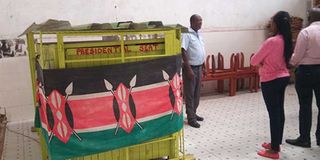Man who made presidential chair hopeful of payment after 26 years

The enclosure housing the presidential seat at the centre of a payment row between Mr Solomon Njoroge Kiore and the State. Mr Kiore sued the State 26 years ago seeking payment for the seat he designed and which was used by former president Moi for a year. The government wants to settle the matter out of court.
What you need to know:
- Furncon Limited sued the government 26 years ago for failing to pay for two presidential seats.
- On February 2018, the State applied to settle the matter out of court.
- Mr Kiore did not object to the government’s applications for negotiations out of court.
The government could pay millions of shillings in an out-of-court settlement for a presidential chair it returned to a designer it contracted after being used by former president Daniel arap Moi for a year.
Furncon Limited through its director, Mr Solomon Njoroge Kiore, sued the government through the office of the Attorney General 26 years ago for failing to pay for two presidential seats he designed, made and delivered according to the terms of a tender he had won.
On February 2018, the State applied to settle the matter out of court, setting the stage for an end of the protracted legal battle that saw Mr Kiore’s business tumble as he cannot use the premises where he has kept the seat.
INSTRUMENT OF POWER
“It is an instrument of power. It was used by the President for a year. It is treasured and therefore no one is supposed to touch it. My business has suffered immensely because of this seat as I cannot allow ordinary mwananchi to tamper with an instrument of power,” he says.
He has since labelled what used to be his workshop ‘The Presidential Seat Warehouse’. The seat is kept under key and lock inside the warehouse.
The company was seeking Sh195 million when it filed the case in 2007 and the amount could now hit the one billion shillings mark if the firm charges storage fee for a treasured instrument of power.
The businessman says although he has not heard from the government since February 27, 2018 when it applied for time to seek an out-of-court settlement, he is optimistic that the seat will find its way to the recently created State House library and museum.

Mr Solomon Njoroge Kiore who designed furniture used by VIPs. PHOTO | BENSON MATHEKA | NATION MEDIA GROUP
OUT OF COURT
He did not object to the government’s applications for negotiations out of court, signalling his willingness to have the matter settled amicably.
Mr Kiore says his company has not been paid since September 1992 when it designed, made and delivered the presidential chair.
It was not the first time for Mr Kiore’s firm to design and sell furniture meant for VIP use in State functions.
He says the seat was made under strict supervision of the military and State House staff.
In its pleadings filed in the High Court in Nairobi, the firm says it won the tender floated by the Department of Defence (DoD) and later got approval from State House.
In order for the furniture to join other insignias of the Republic of Kenya, approval was given by the tender board and later assented to by then President Moi himself.

The Presidential Seat Warehouse where Mr Kiore has stored the chair as he awaits payment by the State. PHOTO | BENSON MATHEKA | NATION MEDIA GROUP
MORE FURNITURE
The firm was asked to make more such furniture for presidential lounges at the Eldoret Moi Airbase and Kahawa Garrison, the company claims.
The company says it was asked to deliver the chairs to the Agricultural Society of Kenya offices in Nairobi for a three-day presidential function. But the President ordered that the furniture remain at the ASK offices, according to a letter by the ASK dated August 5, 1999.
These are the seats whose case the government wants to settle out of court.
In the case, Furncon wants a declaration that the ownership of the items was passed on to the government in September, 1992, under the National Flag, Emblems and Names Act.
Although Mr Moi used the items for a year, Furncon explains that the ASK later wrote to it, advising it to collect the furniture.
Mr Kiore was later called to a meeting at the DoD and advised to go to State House for payment. However, he was sent back to DoD on the grounds that it was the department that had made such payments in the past.





